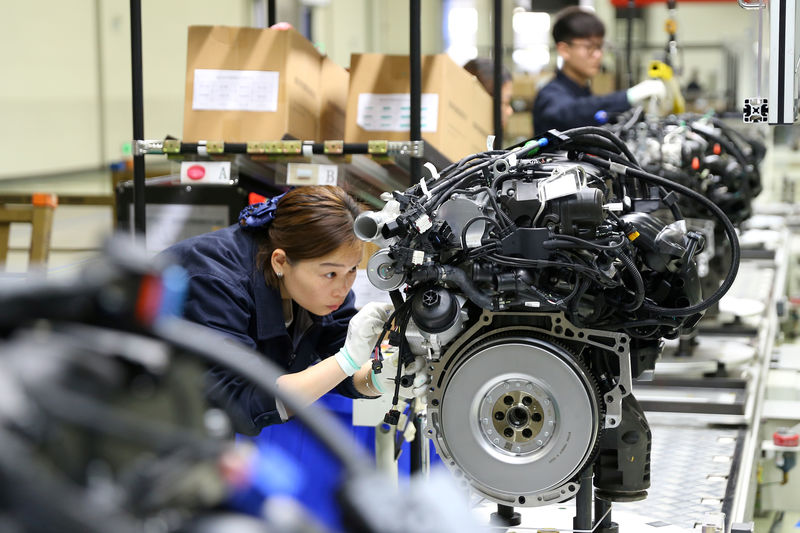BEIJING (Reuters) - China's factory activity in May slumped into a deeper contraction than markets had expected, heaping pressure on Beijing to roll out more stimulus to support an economy hit hard by a bruising trade war with the United States.
Friday's weak manufacturing readings, which follow a recent raft of soft data across the retail, export and construction sectors, could inflame concerns about the risk of a global recession and push more central banks to adopt an accommodative monetary stance.
The official Purchasing Managers' Index (PMI) fell to 49.4 in May from 50.1 in April, data from the statistics bureau showed. Analysts surveyed by Reuters had forecast the PMI to be down a notch at 49.9, below the 50-point mark separates expansion from contraction on a monthly basis.
Factory output expanded at a slower pace as new orders fell for the first time in four months. Export orders extended their decline for the twelfth straight month with the sub-index pulling back significantly to 46.5 from April's 49.2, suggesting a further weakening in global demand.
"Export orders dropped back particularly sharply, which suggests that Trump’s latest tariff hike may already be undermining foreign demand," said Julian Evans-Pritchard, senior China economist at Capital Economics.
While China's exporters are feeling the pinch, Friday's data showed import orders also contracted at a quicker pace, reflecting softening demand at home despite a flurry of growth-supporting measures that were rolled out earlier this year.
Trade tensions between Washington and Beijing escalated sharply earlier this month after the Trump administration accused China of having "reneged" on its previous promises to make structural changes to its economic practices.
Washington later slapped additional tariffs of up to 25% on $200 billion of Chinese goods, prompting Beijing to retaliate.
The tariff standoff has already taken a toll on global growth, trade and business investment. Further inflaming tensions between the economic giants, the Trump administration blacklisted Huawei Technologies Co Ltd, the world's second-largest seller of smartphones, a blow that has rippled through global supply chains and battered technology shares.
Both sides appeared to be digging in as President Donald Trump threatens to increase taxes on all China imports while Beijing ramped up its criticism against Washington, saying provoking trade disputes is "naked economic terrorism".
China's exports unexpectedly fell in April on a sharp drop in shipments to the United States, while industrial output and retail sales also showed surprisingly weak growth last month. Data this week showed profits for industrial firms also contracted in April.
While most analysts believe more stimulus are needed to cushion the economy as external uncertainties cloud the outlook, a senior central bank official said on Thursday a relatively slower rate of monetary expansion would be enough to sustain economic activity.

Despite the weakness in the manufacturing sector, another survey released by the statistics bureau on Friday showed growth in China's services industry remained in solid expansion territory. The official non-manufacturing Purchasing Managers' Index (PMI) held steady at 54.3 in May, unchanged from April.